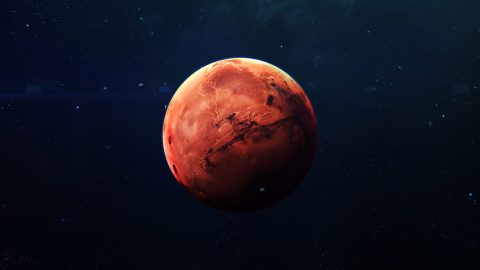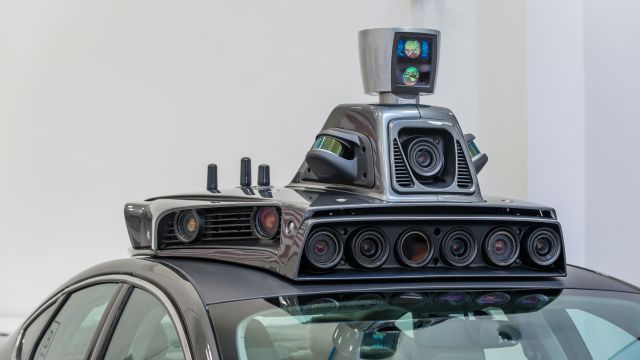Songs of the stars: An interview with sleeping at last

When the shadow of the moon passed through the United States last August, Ryan O’Neal watched in awe and wonder just like millions of other Americans. But while most of us could only marvel at the cosmic spectacle, and later try to convey what we saw and felt and experienced, O’Neal had composed a song about it.
And with that song, aptly titled “August 21, 2017: Total Solar Eclipse,” O’Neal, who makes music under the name of Sleeping at Last, had officially launched his Astronomy series, an ongoing, ever-building repertoire of songs documenting cosmic events. The eclipse song is exactly the same length as the longest duration of totality—2:40.03—one of a number of creative nods to the uniqueness of the event itself.
The Astronomy series is now up to five songs, including the brand-new “Super Blue Blood Moon,” recently released to commemorate that very event yesterday.
Astronomy is just one of many projects O’Neal is juggling these days. He’s also working on phase two of his ambitious three-year Atlas project, which he describes as “an ongoing series of music based on the origins of the universe and life within it.” Year One literally begins before the Earth’s beginnings and gradually zooms into our solar system and, finally, the Earth.
Year Two (subscribe here), literally a work in progress, begins with the origins of life and gradually zeroes in on the things that make us uniquely human. O’Neal is working on the final round of songs of Year Two, each based on one of the nine personality types from the Enneagram. (We told you Atlas was ambitious. It’s a pretty remarkable work of art in progress, and we highly recommend giving it a spin.)
O’Neal unravels a lot of his creative process in his Sleeping at Last podcast, but ORBITER wanted to dig a little deeper. We caught up with him just before the release of “Super Blue Blood Moon.”
ORBITER: What sparked your interest in astronomy and cosmology?
Ryan O’Neal: I’ve been excited about all things space since I was as young as I can remember. I’ve always been fascinated by the idea that no matter where we were on the globe, the beautiful universe above would be a consistent and incredibly inspiring source of light. I’ve always been obsessed with the stars, sci-fi, documentaries about space and NASA—everything space-related I’ve been excited about.
When I was pulling the concepts together for the Atlas project, I was most excited to write the songs inspired by our solar system. That led me to study as much as I could about the makeup of each planet, just to find musical ideas hidden within each planet, and somehow try to write a song that would do justice to the beauty of our solar system.
We’ll talk about Atlas in a bit, but let’s first talk about your Astronomy series, starting with the total solar eclipse song. What did it mean to you to compose this work for a unique North American solar eclipse?
It was good timing because I had the idea to do this Astronomy series, and this was the perfect first event. I drove to Kentucky with some friends and had the most transcendent and beautiful, incredible experience I could have imagined. But I had to write the song before the eclipse, so I listened to different podcasts about previous eclipses. I learned that there are groups of people that follow total solar eclipses around the globe, and they kept talking about it like it was this euphoric experience. [ORBITER interviewed psychologist and eclipse chaser Kate Russo about that “totally emotional” event.]
Did you listen to your own song during the eclipse?
I’m funny about that. When I feel good about a piece of music or a song before it comes out—if I feel good enough to let go of it, and let it be released into the wild, I can’t listen to it again. Otherwise I’d be second-guessing everything, wishing I had done something differently. I’m just too insecure to hear my own music.
So, I didn’t listen to it during the eclipse, but one of my friends did, and it was kind of awesome. We were in the shadow of the longest point of totality, and since I made the song to fit the exact length of totality, it did sync up perfectly for my friend. He’s my friend, so of course he’s going to say he had a nice experience with that.
You wrote a piece on the Cassini Grand Finale, and you got to experience the satellite’s final moments from NASA’s Jet Propulsion Lab (JPL). Tell us about that.
I had just done “Total Eclipse,” and got a call that NASA was gathering musicians to write pieces inspired by the grand finale of Cassini. They invited me, Joe Trapanese, a composer for film and TV, and Sarah Schachner, a composer for video games like Call of Duty and Assassin’s Creed. The three of us wrote a trilogy of Cassini-inspired music, and all three of us got to go JPL and watch the countdown to the finale with many of the people who had worked on the spacecraft. They made a trilogy of music videos, using a ton of NASA footage and real Cassini images. It was really fun, a dream come true as a space nerd. [Listen to and watch the trilogy here: Sleeping at Last, Schachner, and Trapanese.]
And now you’ve just released a song about the super blue blood moon.
Yes. It’s actually three lunar events all in one evening—a blue moon, which is two full moons in a single month; it’s also a super moon, which means the moon comes closest to Earth and appears bigger and brighter in the sky; and then there’s a blood moon, a total lunar eclipse, which tints the moon red.
The post Songs of the Stars: An Interview with Sleeping at Last appeared first on ORBITER.





